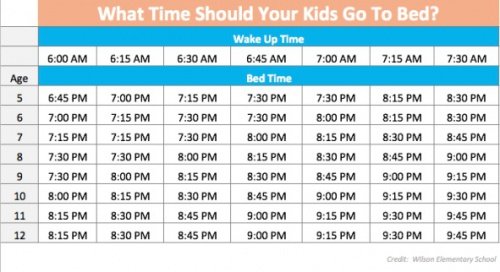
How Much Sleep Your Kids Should Get To Stay Healthy And When You Should Put Them To Bed?
Sleep is essential for health, and that is especially true for children. The amount of sleep a child needs can vary greatly by age, but studies show that the younger a child is, the more sleep they need. In fact, almost half of a healthy childhood is spent asleep. That is why developing good habits and patterns are so important, and why parents focus so much on helping their little ones get enough shut eye.

Newborns start their lives needing a lot of sleep, but not yet settled into any kind of pattern. They are growing so quickly that their awake time mainly coincides with nutritional and other bodily needs. By a year of age, they should be sleeping regularly through the night, as well as taking daytime naps. That nap will usually be phased out by the time they are ready for primary school, and their sleep needs will gradually lessen. However, even older children need more sleep than adults – up to 10 hours is normal, and less can lead to sleep deprivation.
Nor is a shortage of sleep something to ignore. It can lead children to have a harder time learning and interacting with their peers, which can have long-term effects on their academic and social lives. The physical side effects are just as serious and include a higher risk of both obesity and diabetes. Children may also misbehave more when tired. It is counter-intuitive, but a child who is always hyperactive may actually be sleep deprived. Moreover, the immune system takes a serious hit when the body isn’t sleeping enough, due to a lack of cytokines and other protective proteins and antibodies that are produced during sleep.
RELATED ARTICLE: The Exact Number Of Hours You Need To Sleep According To Your Age
Luckily, there are quite a few natural remedies and techniques to help soothe a child who has trouble nodding off. For babies and toddlers, learning to self-sooth is important. This means that parents should not wait until the child is asleep to put them in their crib, nor should they immediately rush towards a fussy baby at night. Learning to self-soothe is an important skill that will carry through childhood. This is not to say that a wailing child should be ignored for long stretches of time, but rather that a drowsy, happy baby should be allowed to fall asleep by themselves in their cribs, rather than in their parents arms.
As children get older and more mobile, it can become harder to encourage sleep. Young children, especially those who need to wake early for school, should be in bed by 8:00 pm at the latest. That time should remain consistent even on weekends. A bedtime routine that includes a soothing activity like reading a book can help get children into a quieter mindset, and it’s okay to let kids know that lying quietly for a short time before falling asleep is also acceptable. That can relieve any internal stress they have about instantly sleeping, as well. TVs should be avoided late at night, as should any caffeine and sugar. This may mean avoiding soda or even juice in the evening. A dark room that is kept slightly cool also helps to let the body know that it is time to sleep.

Sleep is important for a wide range of reasons. Children who are sleep deprived may behave badly or get sick more easily. Creating and sticking to a strict sleep schedule will not only benefit them greatly, it will be a huge boon for parents who are equally tired. It may take time, but a solid sleep routine is possible for every child.





